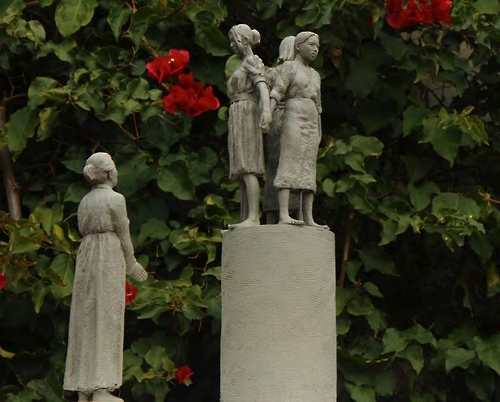Come the end of this year, San Francisco is expected to have a new — and undoubtedly controversial — memorial: a tribute to the so-called “comfort women,” young sexual slaves taken by Japanese soldiers, of World War II.
A design for the statue, by the sculptor Steven Whyte, was announced by the San Francisco Arts Commission’s Visual Art Committee at the end of December. The memorial shows three young girls standing atop a pedestal, each from a different country, and an old woman — a representative of surviving comfort women — gazes up at the trio.
It’s a deviation from the statue of a seated young girl next to an empty chair, which was first placed in front of the Japanese embassy in Seoul, then replicated and installed in cities like Glendale, California, and Southfield, Michigan.
San Francisco’s board of supervisors unanimously approved the erection of a comfort women memorial, complete with a plaque explaining the history and impact of the horrors faced by an estimated 200,000 women, in 2015.
The memorial will stand between Chinatown and the Financial District.
“This work shows not only that sexual slavery was a problem of the past, but that it continues today, and is not a conflict between just two countries but is a women’s rights violation across the globe,” Kim Hyun-jung, executive director of the Korean American Forum of California, told South Korea’s Yonhap news agency.
The issue of the comfort women has long been a source of contention not just between Korea and Japan, but between Korean American and Japanese American community groups.
According to the Rafu Shimpo, in addition to a Japanese American group, the Global Alliance for Historical Truth (GAHT), opposing the memorial, the mayor of Osaka, Toru Hashimoto, penned a letter to the board urging them not to install the memorial.
That’s not to say all Japanese American groups stand as one on the subject — in years past, the largest Japanese American organization in the country, the Japanese American Citizens League, voiced its support of the installation of such memorials.
Last year, GAHT lost the appeal on a lawsuit it filed against the City of Glendale regarding the removal of the statue. Meanwhile, the California State Board of Education voted to teach a short history of the comfort women — described as institutionalized slaves “forced into sexual service by the Japanese Army” — in its 10th-grade textbooks.







